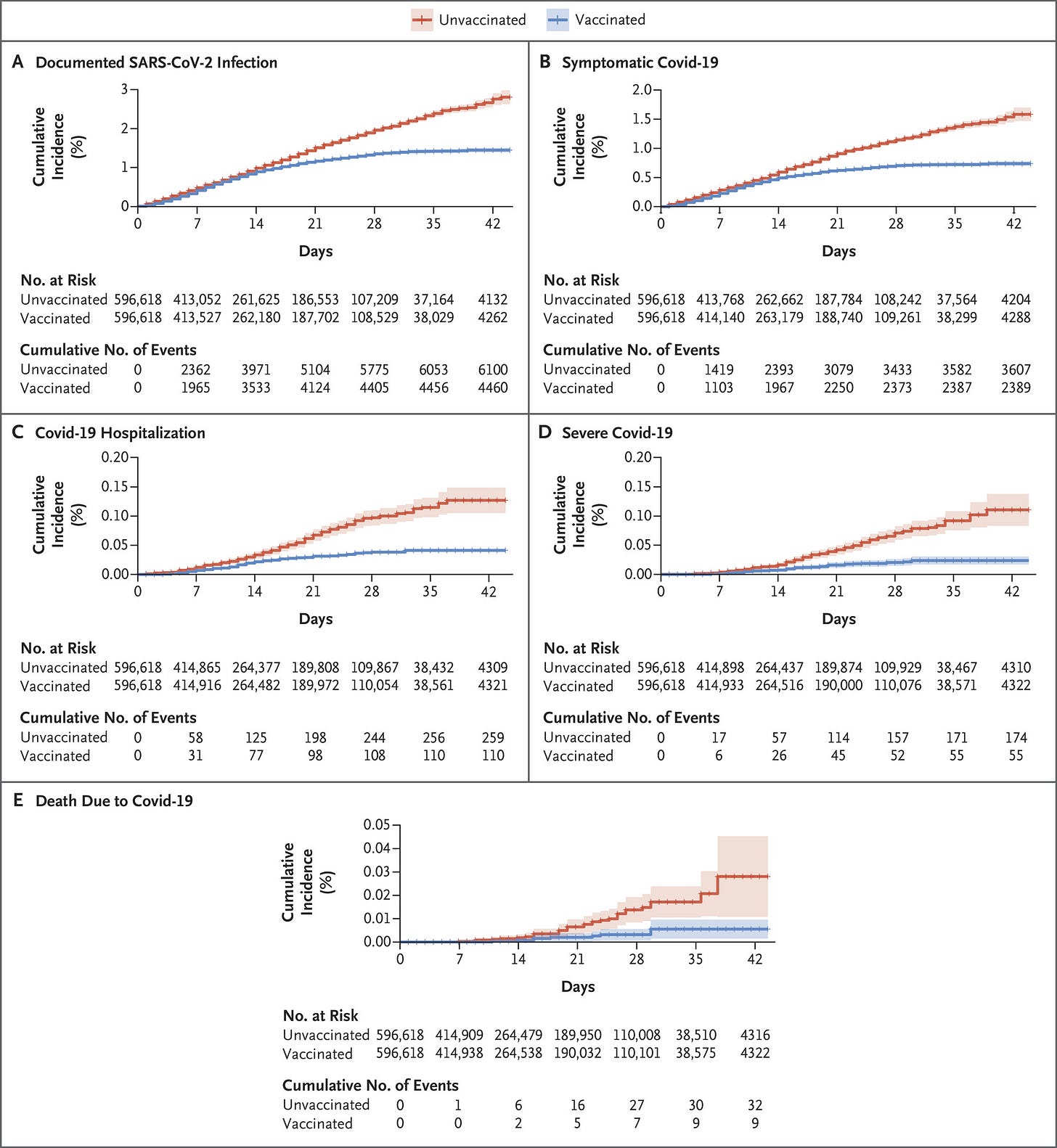I’m sure you’ve heard stories about “breakthrough” COVID cases post vaccination.
I’ve seen cases in the hospital of patients hospitalized with COVID after receiving their vaccines. I’ve heard reports from patients citing the lack of total protection as a reason not to get vaccinated.
So obviously, none of these vaccines are 100% effective.
How well do they actually in the real world? We know that the clinical trials show tremendous results from all of these vaccines (even Johnson and Johnson).
But clinical trials don’t always capture the entirety of the real world experience, which is why we do post market surveillance and data collection - both to catch rare side effects, like blood clots and to better measure effectiveness.
We have newly published research on the mass vaccination program in Israel that gives us more insight into how well the Pfizer vaccine works in practice.
The Israeli study evaluated almost 600,000 vaccinated patients who didn’t have to meet strict clinical trial inclusion criteria
That’s a lot of people!
And since it happened in the real world rather than in a clinical trial, we can better measure effectiveness across a diverse population with a wide range of pre-existing conditions “in the midst of imperfect adherence to vaccination protocols and the challenges of cold-chain maintenance and vaccine-deployment logistics.”
The researchers matched the 596,618 people to unvaccinated controls but weren’t able to perfectly match the older patients. So we end up with an apples to slightly younger apples comparison.
In other words, the vaccinated group is older and sicker at baseline than the unvaccinated controls, so you need to temper your interpretation of the results accordingly - the vaccine will look worse in this study than it actually is because of challenges with population matching.
They didn’t include nursing home residents or health care workers, but these groups are a tiny fraction of the overall percentages (only about 3%).
In the real world, the vaccine is still awesome!
Seriously, it’s fantastic. Let me show you.
They measured outcomes that we care about:
COVID infection
Symptomatic COVID
Hospitalization from COVID
“Severe” COVID
Death from COVID
Take a look at the graphs below, the pattern is the same for each. The rate of these bad outcomes post vaccine plateaus 3-4 weeks after receiving the first vaccine dose.
If you’re wondering why the death curve looks like it has a rise later than that, it’s because death is a lagging indicator and will always show up after symptomatic infection or hospitalization.
If you just read the top-line numbers from the results, you’ll come away confused
The authors report numbers at a couple of different time points - days 14-20 after the first dose, days 21-27 after the first dose, and 7 days after the second dose.
They present a complicated chart with all of their outcomes at the various times. Reading through it can be super confusing.
So let’s take a look back at the outcomes that they measured and the documented effectiveness at 7 days post second vaccine dose:
COVID infection - 92%
Symptomatic COVID - 94% effective
Hospitalization from COVID - 87% effective
“Severe” COVID - 92% effective
Death from COVID (measured days 21-27 after first dose rather than 7 days after second) - 84% effective.
I would expect that death number to look even better measured later on.
So the take home point here is that the Pfizer vaccine is amazing in the real world. It doesn’t protect you 100%, but nothing does, not even a parachute.
To put this in perspective - think about the COVID vaccine like you’d think about a flu shot
The flu shot is basically never this effective. The fact that we have COVID vaccines that can get to these numbers is a scientific miracle.
The “breakthrough” cases that I’m seeing don’t change my overall opinion about vaccination or about letting down your restrictions (AKA opening your life back up) after you’ve been vaccinated.
Your chance of getting really sick or dying from COVID is astoundingly low after vaccination. I think about this sequentially:
The vaccine gives you a huge amount of protection against being infected with COVID in the first place.
Even if you’re infected, the vaccine reduces your chances of developing symptoms
Even if you’re symptomatic, the vaccine reduces your chance of needing to be hospitalized
Even if you’re hospitalized, the vaccine reduces your chance of death
In other words, I see vaccination as a no-brainer. It works in trials, it works in the real world.
COVID remains bad and avoiding COVID remains good.
Thank you for reading! If you’re enjoying my newsletter, please consider sharing with your friends and family and encouraging them to subscribe!
I always appreciate any feedback or thoughts you might have. You can reply directly to this email to reach me directly.




